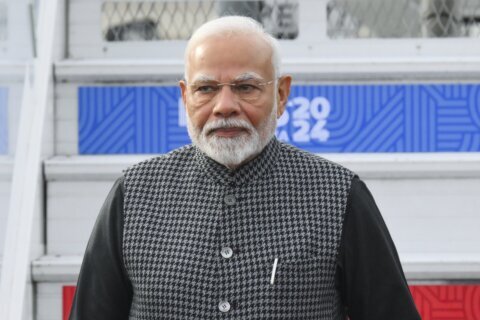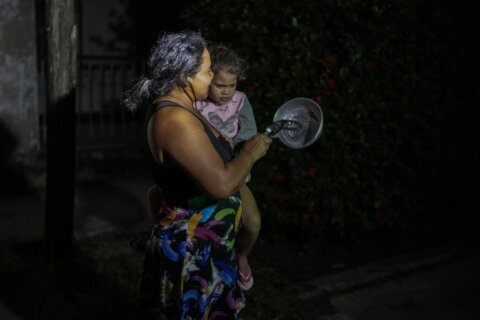Anxiety disorders are the most common mental health problem in America. An estimated 40 million adults in the United States will suffer from an anxiety disorder within their lifetime, according to the Anxiety and Depression Association of America.
Traditional treatment includes talk therapy and medicines to manage anxiety. While those are effective for many people, more and more individuals living with anxiety are increasingly looking to cast a wider net for alternative treatment options, including acupuncture.
[READ: 6 Surprising Signs You May Have Anxiety.]
What Is Anxiety?
Everyone has moments of anxiety throughout their life — it’s a normal reaction to feelings of stress. Some anxiety can actually be beneficial in some situations, as it activates a fight or flight instinct and helps you prepare and pay sharper attention to what’s around you.
The difference between anxiety-inducing moments and an anxiety disorder is that feelings of anxiousness are persistent and recurring for those affected. Feelings of anxiety are disproportionate to the situation and make the ability to function normally difficult and, in some cases, impossible.
This can have a high societal, economic and personal cost, resulting in anything from absenteeism from work or school to reduced productivity or severe strain on relationships. In more serious situations, anxiety can lead to hospitalization or substance abuse.
According to therapist Laura Rhodes-Levin, founder of The Missing Peace-Center for Anxiety, which is based in Agoura Hills, California, anxiety impacts the nervous system, blood pressure, stomach and often affects sleep and diet. “Experiencing one or more of these symptoms is draining and has a big impact on quality of life. Usually, severe anxiety is accompanied by social anxiety, which has a life impact on a whole other level. It ultimately affects us — mind, body and spirit.” Rhodes-Levin is also chair of the Anxiety and Depression Association of America’s Integrative Behavioral Health Special Interest Group
Anxiety disorders are the most common psychiatric disorder and affect more than 15 million adults on a yearly basis in the United States. According to the American Psychiatric Association, women are more likely than men to be affected by an anxiety disorder.
[Read: Do I Have Social Anxiety or Something Else?]
Types of Anxiety
There’s no single cause that determines if someone will develop an anxiety disorder. Scientists believe it’s a combination of both genetics and environmental triggers. There are many types of anxiety disorders, such as:
— Generalized anxiety disorder.
— Specific phobias, like the fear of heights or spiders.
— Separation anxiety disorder.
The good news is that anxiety disorders can be managed, but only about 37% of those suffering seek treatment.
Understanding Acupuncture
Acupuncture has become increasingly popular over the past 40 years, becoming one of most common alternative medicine approaches in the United States. A survey published in the journal Psychosomatics found that nearly one-third of people with anxiety disorders use alternative therapies such as acupuncture along with massage or relaxation techniques.
An essential component of traditional Chinese medicine, acupuncture involves the insertion of sterile and very thin needles through the skin at strategic pressure points. This balances the flow of energy — known as chi or qi — through the pathways or meridians in the body. Inserting needles at specific points along these pathways rebalance energy flow.
The idea of inserting needles into the skin can be off-putting to some; however it’s done with a light touch and you should hardly feel it — the needles aren’t inserted deep enough in the skin to make a person bleed. The Food and Drug Administration regulates acupuncture needles as medical devices to be safely used by board-certified, trained professionals.
Potential side effects are minimal, and they may include:
— Fatigue.
— Mild bruising.
— Soreness.
— Lightheadedness.
After starting treatment, talk to your doctor if you experience any potential side effects.
“In the 27 years I’ve been practicing acupuncture, I have yet to witness a negative side effect from acupuncture,” says Chris Powell, founder of Missouri Acupuncture & Wellness Services in Kansas City, Missouri.
[Read: Does Your Health Insurance Cover Alternative Medicine?]
Effectiveness of Acupuncture for Anxiety
A growing body of evidence shows the benefits of acupuncture to overall health. Acupuncture is used to treat a myriad of health problems, including:
— Chronic pain.
— Headaches.
— Parkinson’s disease.
— Type 2 diabetes.
Acupuncture is most commonly used to treat pain, however increasing attention has turned to how it can affect overall wellness, including anxiety and stress management. “Acupuncture stimulates the body’s natural feel-good hormones and reduces the level of stress hormones like cortisol, making it a potentially important tool,” Powell says.
Pharmacology and psychotherapy are the conventional treatments for anxiety disorders. Alternative modalities such as acupuncture, massage therapy, biofeedback therapy, yoga, meditation, exercise and supplements are all gaining popularity as forms of treatment that may have benefits.
“I would encourage people to stretch out of their comfort zone. Acupuncture redirects energy which is important with anxiety,” Rhodes-Levin says. “We tend to want to think our way out of anxiety, but the most effective thing to do is use your body and your senses to calm your anxiety, then you can start talking about how you think without being hijacked by your emotion center.”
Clinical studies regarding acupuncture and its use in specifically treating anxiety historically have been limited; however, this is changing as it gains further acceptance into mainstream medicine.
“In the last few years, there’s been a lot of research looking at how acupuncture affects the physiological response in the body to manage stress and pain,” Powell adds.
Mounting Evidence
There’s evidence from multiple studies that acupuncture helps certain symptoms of anxiety. Researchers are still exploring the effect of acupuncture on specific types of anxiety disorders.
— One 2021 analysis looked at 20 studies focusing on general anxiety disorder. The analysis suggests that acupuncture therapy aimed at reducing anxiety in patients with general anxiety disorder had significant benefits.
— A 2018 review of the results of 13 studies examining the treatment of anxiety with acupuncture found that all studies reported a decrease in anxiety. The studies also resulted in effective outcomes with fewer side effects than conventional treatment, which included medications in some studies.
— Another study comparing acupuncture, conventional treatment and a treatment program that integrated acupuncture and talk therapy found that integrative treatment and therapeutic acupuncture significantly and clinically reduced anxiety and depression compared with conventional treatment. Moreover, about half of the patients in both the integrative acupuncture and acupuncture groups with initial depression or anxiety achieved significant improvements following treatment.
There is no one cause of an anxiety disorder, and there is no one solution. “Acupuncture has been shown to be moderately effective in managing anxiety and if done by an experienced practitioner, can be one component of a holistic approach to anxiety and stress management,” Powell adds.
More from U.S. News
12 Proven Strategies to Stop Overthinking and Ease Anxiety Now
Best Ways to Practice Self-Care
Does Acupuncture Work for Anxiety? originally appeared on usnews.com
Update 03/28/22: This story was previously published at an earlier date and has been updated with new information.







